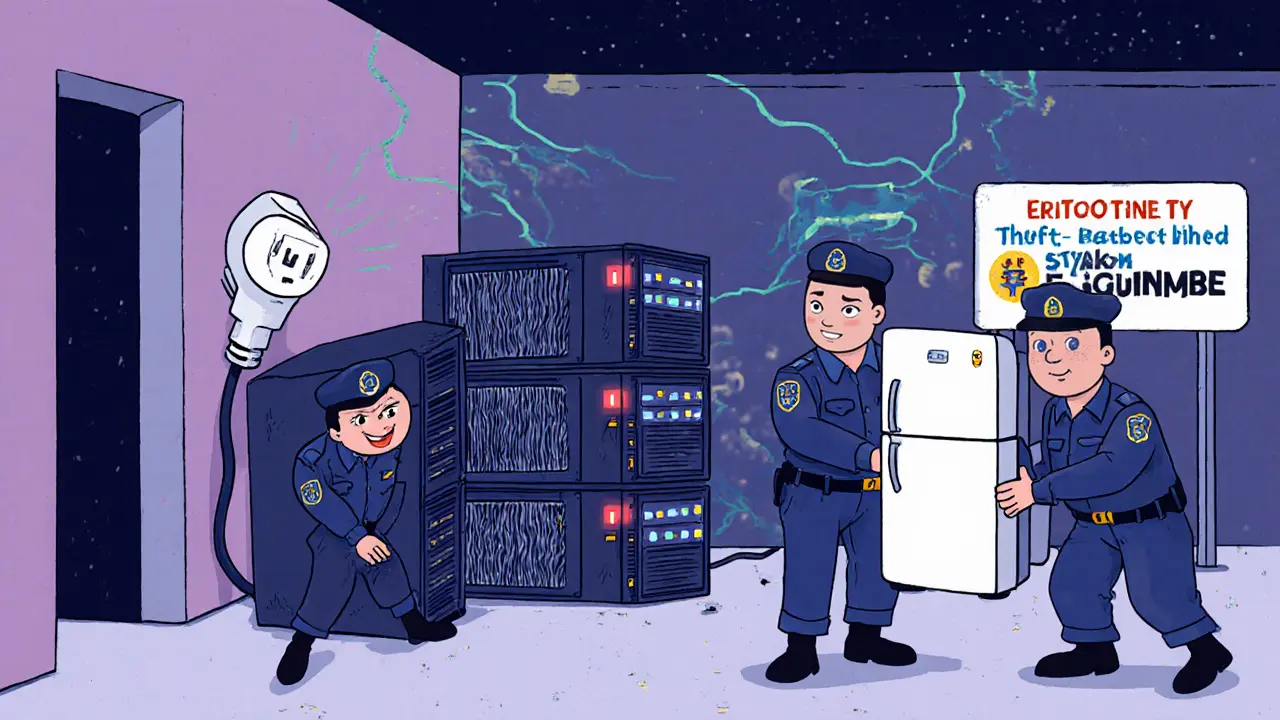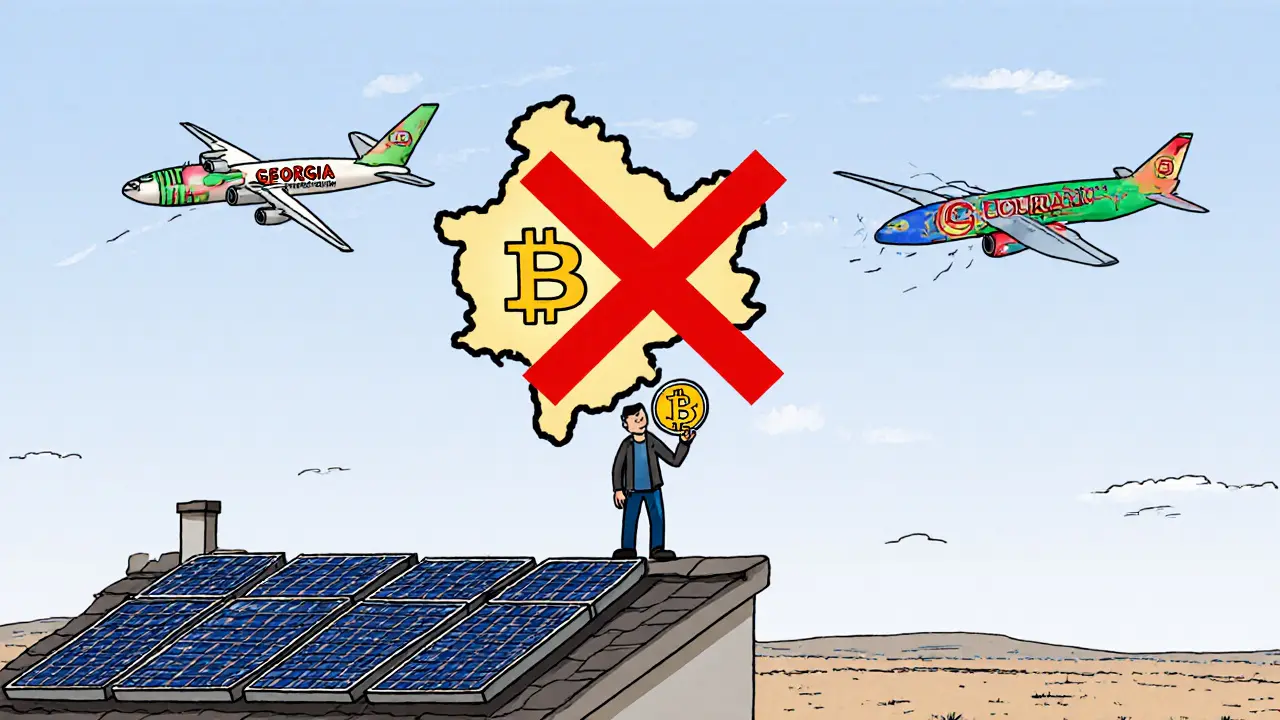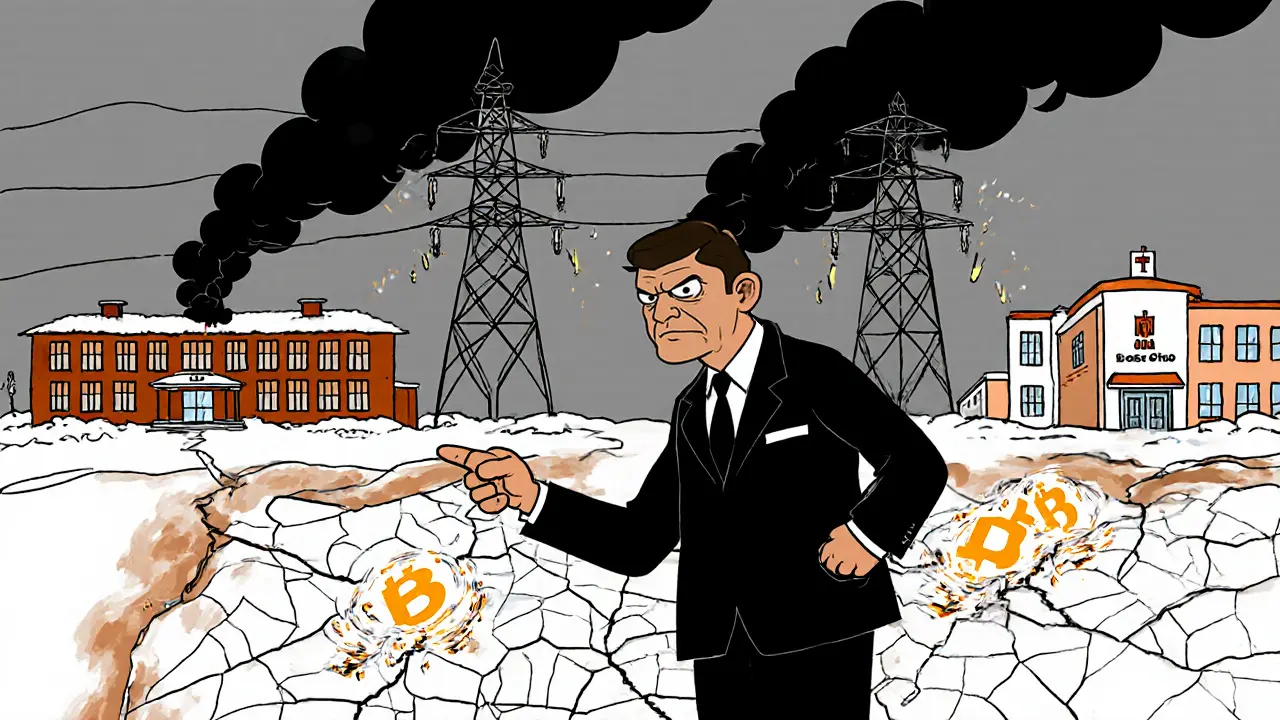Kosovo Mining Energy Calculator
Calculate Your Mining Impact
See how much electricity cryptocurrency mining consumes compared to Kosovo's energy crisis in 2022. The ban was enacted because mining was consuming up to 15% of the country's electricity.
Results
Back in January 2022, Kosovo shut down all cryptocurrency mining overnight. Not a slowdown. Not a tax. Not a permit system. A full, immediate ban. And it wasn’t because of moral panic or anti-tech sentiment. It was because the country was running out of electricity. Homes were going cold. Hospitals were on backup generators. And hundreds of bitcoin rigs were quietly sucking up power meant for schools and clinics.
Why Kosovo Had No Choice
Kosovo’s power grid was already stretched thin. The country relies on coal for over 90% of its electricity, and its aging plants couldn’t keep up with demand. Winter was coming. Prices were rising. And then came the real kicker: people in northern Kosovo - mostly ethnic Serbs - weren’t paying their electricity bills at all. For years, the government turned a blind eye. But when cryptocurrency miners started showing up, setting up massive farms in abandoned factories and basements, they weren’t just using unpaid power - they were using publicly subsidized power to make private profits. Miners didn’t care about politics. They cared about cheap electricity. And Kosovo, with its low rates and lax enforcement, became a magnet. By late 2021, estimates suggested crypto mining was consuming up to 15% of the country’s total electricity output. That’s like every third lightbulb in the country being powered by someone mining bitcoin in a garage. When the government declared a state of emergency in December 2021, it wasn’t just about winter. It was about survival. On January 4, 2022, Minister of Economy Artane Rizvanolli announced the ban. No more mining. No exceptions. Not even for solar-powered rigs. At first, even that wasn’t enough.How the Ban Was Enforced
The government didn’t just pass a law. They built a system to catch violators. Electricity providers started flagging unusual spikes in consumption - like a small village suddenly using the same power as a small town. Police and customs teams launched coordinated raids. By March 2022, they had seized over 300 mining rigs. Some were hidden in basements. Others were disguised as server farms. One was found in a school building in Prizren. The raids weren’t random. They targeted areas where electricity theft was already common - places like Mitrovica and Leposavić in northern Kosovo. These weren’t just miners. They were exploiting a broken system. The government’s message was clear: if you’re not paying for electricity, you’re not allowed to use it - no matter how digital your profit is. The ban was originally meant to last until March 2022. But as energy shortages dragged on, it got extended. In August 2022, it was renewed for another 60 days. Then again. Then again. Each extension came with a new warning: if the grid stays under pressure, the ban stays.What’s Allowed Now? (2025 Update)
As of 2025, mining is still illegal in Kosovo - but there’s a tiny crack in the door. The government now allows cryptocurrency mining if it runs entirely on alternative energy sources - like solar, wind, or hydro - and doesn’t draw a single watt from the national grid. That means if you’ve got your own solar panels and batteries, and you’re not connected to KESH (Kosovo’s state power company), you’re technically not breaking the law. But here’s the catch: no one’s done it yet. Why? Because the legal gray area is too risky. Even if you’re off-grid, you could still be accused of circumventing the spirit of the law. Banks won’t touch crypto-related businesses. Payment processors block transactions. And the government hasn’t issued a single permit or license for mining - even for solar-powered setups. So while the rule technically has an exception, in practice, mining remains banned.
Who Got Hurt? (And Who Didn’t)
The ban didn’t just stop miners. It stopped everything. Investors who had planned to build crypto hubs in Pristina walked away. Developers who wanted to launch local crypto exchanges shut down their projects. Even ordinary people who wanted to use Bitcoin for remittances - a huge need in Kosovo, where over 40% of the population has family abroad - lost access to cheaper, faster money transfers. The diaspora is massive. Over 1.5 million Kosovars live outside the country, mostly in Germany, Switzerland, and the U.S. Sending money home through Western Union or Wise can cost 5-8%. Bitcoin could have slashed that to under 1%. But because the government banned all crypto activity, those options vanished. Meanwhile, miners didn’t disappear. They just moved. Many relocated to neighboring countries like Georgia, Kazakhstan, and Ukraine - places with cheaper, more stable power and clearer rules. Kosovo lost jobs, tech talent, and potential tax revenue. And it didn’t get a new energy source in return.Why This Matters Beyond Kosovo
Kosovo’s ban was one of the first times a country shut down crypto mining not because of fear of decentralization - but because of fear of blackouts. It came right after China’s 2021 mining crackdown, which kicked out 75% of the world’s Bitcoin miners. Kosovo was the next domino. And it showed the world something new: you don’t need to be a tech superpower to say no to crypto. You just need to be running out of power. Environmental groups like Greenpeace USA pointed to Kosovo as a model. Why let miners drain grids when the climate crisis is worsening? Why let private companies profit off public infrastructure? Other countries took note. In 2023, Egypt and Bangladesh moved to restrict mining. In 2024, Algeria and Morocco followed. Kosovo became a case study in energy-first policy.
The Bigger Picture: Regulation Without Clarity
Kosovo’s government never created a clear legal framework for crypto beyond the mining ban. No rules for trading. No tax guidelines. No licensing. No consumer protections. That’s the problem. They didn’t just ban mining. They banned the entire ecosystem - without replacing it with anything. The result? A vacuum. No one can legally buy, sell, or mine crypto in Kosovo. But people still do - quietly, through peer-to-peer apps or offshore exchanges. That’s dangerous. No regulation means no protection. No recourse if you get scammed. No way to report fraud. And while the government talks about future legislation, nothing has materialized. The Committee for Economy in the Assembly of Kosovo promised new crypto laws in 2023. Nothing came. In 2024, they said they were “evaluating.” Still nothing.What’s Next for Kosovo?
Kosovo is stuck. The ban worked to save the grid. But now, the country is paying a different price: isolation from the global digital economy. Young tech entrepreneurs can’t build crypto startups. Remittance services can’t innovate. Investors avoid the country entirely. Meanwhile, neighbors like North Macedonia and Serbia are quietly building crypto-friendly zones. The only real path forward? A clear, transparent policy that separates mining from trading. Allow solar-powered mining - with strict metering and reporting. Legalize crypto trading with proper KYC and taxation. Let people send money home using crypto, with government-backed oversight. But until then? Kosovo remains one of only eight countries in the world with a full crypto mining ban. And while the lights stayed on, the future dimmed.Is cryptocurrency mining still illegal in Kosovo in 2025?
Yes. As of 2025, cryptocurrency mining remains illegal in Kosovo under the 2022 ban. While the law technically allows mining if powered entirely by off-grid renewable sources like solar or wind, no permits have been issued, and no operations are legally recognized. Enforcement remains strict, and using the national grid for mining is still a criminal offense.
Why did Kosovo ban crypto mining in 2022?
Kosovo banned crypto mining because it was consuming up to 15% of the country’s electricity during a severe energy crisis. Power plants were aging, coal supplies were unreliable, and many households - especially in northern Kosovo - weren’t paying their bills. Miners were using subsidized or unpaid electricity to profit, while schools and hospitals struggled to stay powered. The government acted to protect public energy access.
Were any mining devices seized during the ban?
Yes. In the first few months after the January 2022 ban, police and customs authorities confiscated more than 300 cryptocurrency mining rigs. Many were found in basements, warehouses, and even public buildings. The raids focused on areas with high electricity theft, especially in northern Kosovo.
Can I use Bitcoin in Kosovo for remittances today?
No. While Bitcoin could offer low-cost remittance options for Kosovo’s large diaspora, the government has banned all cryptocurrency-related activities, including trading and transfers. Banks and payment services won’t process crypto transactions. People still use informal channels, but they do so at legal risk and without consumer protection.
Is there any chance Kosovo will lift the ban?
Unlikely in the near term. The ban is tied to energy security, and Kosovo’s grid is still vulnerable. While off-grid solar mining is technically permitted, the government hasn’t created any legal pathway for it. Without clear rules, tax policies, or enforcement guidelines, no one dares to try. The focus remains on protecting electricity access, not enabling crypto.

7 Comments
So Kosovo basically said, 'We're not a crypto playground, we're a country trying to keep the lights on' - and honestly? Respect. I've seen so many places chase crypto hype while their hospitals blackout. This isn't about ideology, it's about survival. The fact that they didn't just ban mining but also cracked down on electricity theft? That's governance. Most governments would've just printed more money or begged the IMF. They chose responsibility.
And now? They're stuck with a vacuum. No regulation, no innovation, no remittance options for diaspora families. It's like shutting down a highway because too many cars were speeding - but then refusing to build a new road. The solution was right, but the aftermath? Messy.
Also, the solar exception? Pure theoretical. No one’s dumb enough to set up a rig in their backyard and hope the government doesn’t come knocking. There’s zero trust in the system now. That’s the real tragedy.
I’m from rural Pennsylvania, and I’ve seen coal plants shut down and communities collapse - so I get why Kosovo acted. But what breaks my heart is how they didn’t plan for the next step. You can’t just outlaw an entire digital economy and expect people to magically go back to 2005. People were using Bitcoin to send money home because Western Union was bleeding them dry. Now, those families are stuck with higher fees, slower transfers, and no recourse.
And the miners? They didn’t vanish - they just migrated to Georgia and Kazakhstan, where the rules are clearer and the power is cheaper. Kosovo lost jobs, tech talent, and potential tax revenue - all while the grid barely improved. The ban saved electricity, sure - but at the cost of cutting off a generation from the future.
It’s not anti-crypto. It’s anti-chaos. But chaos doesn’t disappear just because you slap a ban on it. It just goes underground. And that’s more dangerous than any rig in a basement.
What’s next? A black market for crypto remittances? A surge in P2P apps? Or will they finally admit they need a framework, not just a firewall?
This is why you can’t trust liberals to run a country. They ban crypto because they’re scared of tech, not because they care about power. The real problem? Corrupt officials letting Serbs steal electricity for decades. Now they blame miners? Pathetic. Just let people mine. Let the market fix it. Stop being so scared of innovation. You’re just making Kosovo irrelevant.
As someone from India, where electricity blackouts are still a daily reality in many towns, I can’t help but admire Kosovo’s resolve. We’ve had crypto miners setting up in rural areas here too - using stolen power, running rigs 24/7, and leaving behind overheated transformers and angry villagers.
But what Kosovo did differently? They didn’t just punish. They investigated. They mapped consumption spikes. They targeted theft zones. That’s not just policy - that’s intelligence.
Still… the silence since 2022 is deafening. No licensing. No exemptions. No dialogue. It’s like they froze the whole ecosystem in amber. If you’re going to ban something, at least build a bridge to what comes after. Otherwise, you’re not protecting the grid - you’re burying the future with it.
And yes - I’ve seen solar-powered mining setups in Kerala. They work. With proper meters, monitoring, and taxes - it could’ve been Kosovo’s green tech export. Instead? They chose fear over foresight.
The ban worked. Grid stabilized. No more blackouts in winter. That’s the win.
Hey, I read this whole thing because I’m from a country that just legalized crypto mining last year - but only if you use solar and pay a fee. Kosovo’s story is the opposite: they banned it because they couldn’t afford to regulate it. And honestly? That’s a brutal but honest lesson.
Most countries talk about crypto like it’s the future. Kosovo said: 'We’re still trying to keep our kids warm.' And they chose that over hype.
The solar loophole? Cute. But without permits, without banks, without legal clarity - it’s just a footnote. A ghost clause. A reminder of what could’ve been if they’d had the courage to build something new instead of just shutting something down.
Maybe one day they’ll fix it. But for now? They’re a cautionary tale. Not because they banned crypto. But because they stopped thinking after the ban.
Kosovo banned mining because they’re weak. Power grid? Fix it. Taxes? Enforce them. Don’t punish innovation because you’re too lazy to manage your own country. Now they’re stuck with a useless ban and zero tech growth. Typical europeans. Just say no to everything and call it policy.